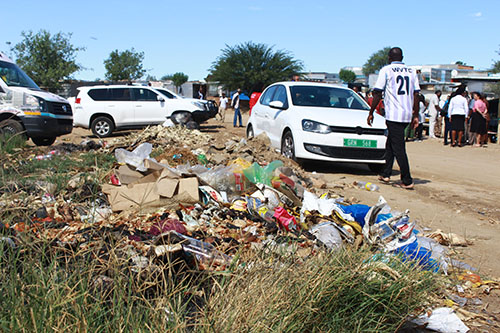Kuzeeko Tjitemisa
Urban and rural development deputy minister Natalia /Goagoses has raised serious concerns over the dilapidating state of the country’s towns, describing the situation in many towns as “dirty”.
The remarks come despite the capital, Windhoek, having been declared the cleanest city in Africa more than a decade ago.
“Since my appointment, I managed to visit many towns in Namibia – and my observation is that most towns are dirty; my office is currently working on the cleanest town competition proposal to recognise those regions and towns who are putting an effort in keeping their towns clean,”
/Goagoses said yesterday. She made these remarks while officiating a five-day induction workshop for newly-elected regional and local authority councillors as well as newly-appointed chief regional officers (CROs) currently underway in Otjiwarongo, Otjozondjupa region. She also warned new councillors and CROs against abuse of public funds and power as well as against tribalism, victimisation and intimidation. “Over the years, it has also become a tendency of some councillors, using the council and management committee meeting platforms for their agendas or to settle scores with administrative staff or among themselves, and maladministration has been the order of the day in
some councils,” /Goagoses said, adding that such conducts should not be tolerated.
“I urge you to have trust in your CROs, CEOs and their management – and if you, the councillors, have doubts in the advice given, please refer the matter to the ministry. The administrators are professionals hired to implement the lawful resolutions of the council within the legal and monetary framework for the benefit of the communities”.
/Goagoses further warned against “unfair demotion or suspension of employees, especially at management level, which she said had become a common occurrence lately.
She said voters expect elected officials to deliver the services with the public resources they entrusted in their care. These public resources, she said, include the infrastructure, funds, equipment and staff complement.
“It is expected of us to deliver services and ensure that the needs of everyone in the community are catered to without discrimination on the basis of political affiliation, tribe, religion or social background”.
The five-day induction will cover various critical areas pertaining to the regional and local government operations, administration and governance to equip councillors with the basic information and skills that will enable them to run councils effectively and efficiently.
Additionally, the workshop will provide a fertile platform for regional and local government officials – both appointed and elected – to candidly reflect on the pressing national and local government issues, to share ideas on the challenges and articulate collective solutions to take regional and local government to the next level.
/Goagoses said, from her experience, having worked at subnational government as the CRO and minister’s representative at Rehoboth Town Council, she has realised that subnational is a vital sphere of government because they are the governments of proximity to the people. “This is where the real action of governance, peoples’ participation and basic service delivery takes place, and I believe that subnational structures have a key role to play in nation-building and the social cohesion of our people”. “We, at the ministry, also share the quest to make regional government, local government and traditional authorities people-centred and more responsive to the developmental and knowledge-based challenges of the day”. – ktjitemisa@nepc.com.na



